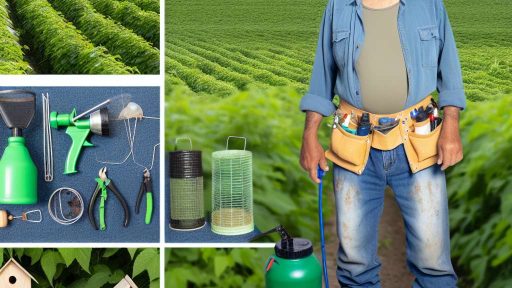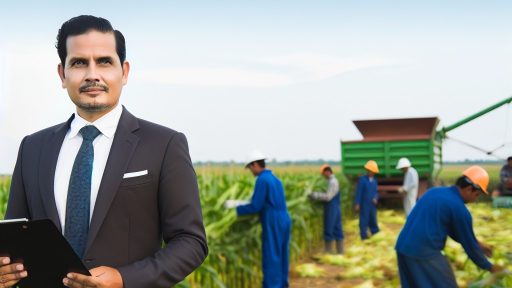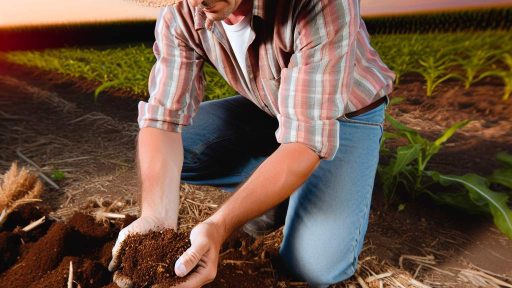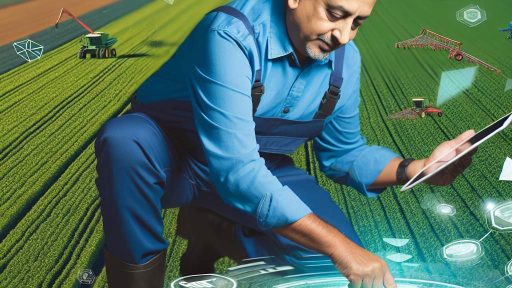Introduction to the Role of Technology in Agriculture
Technology plays a vital role in modern agriculture.
It boosts efficiency and enhances crop yields.
Agricultural technology encompasses various tools and methods.
Farmers increasingly adopt technology to meet growing demands.
Advancements in Agricultural Technology
Recent advancements revolutionize traditional farming practices.
For instance, precision agriculture optimizes resource use.
This approach reduces waste and increases productivity.
Moreover, drones offer innovative solutions for crop monitoring.
They provide real-time data to farmers across vast fields.
Data-Driven Decision Making
Data analytics transform how farmers make decisions.
Farmers can analyze soil conditions and weather patterns.
This information helps them choose the right crops.
Consequently, they can develop targeted fertilization strategies.
Furthermore, data improves pest management efforts.
Enhancing Sustainability
Technology contributes to sustainable farming practices.
Transform Your Agribusiness
Unlock your farm's potential with expert advice tailored to your needs. Get actionable steps that drive real results.
Get StartedSmart irrigation systems conserve water resources effectively.
They adapt to weather changes, reducing excess water usage.
Additionally, carbon farming technology captures greenhouse gases.
This practice promotes healthier soils and better crop production.
Collaboration in Agriculture
Collaborative platforms enhance farmer connectivity.
Farmers share insights and resources through these networks.
This exchange leads to collective problem-solving.
Moreover, partnerships with tech companies drive innovations.
Such collaborations are crucial for overcoming current challenges.
Overview of Traditional Farming Practices and Their Limitations
Historical Context
Traditional farming practices have been the backbone of agriculture for centuries.
Farmers relied on methods passed down through generations.
These practices emphasized manual labor and basic tools.
As a result, many farmers became adept at local conditions.
Challenges Faced by Traditional Farming
Traditional farming often encounters a variety of challenges.
One significant issue is the dependency on weather patterns.
Unexpected climate changes can significantly impact crop yields.
Additionally, pests and diseases can devastate harvests.
This unpredictability creates financial risks for farmers.
Limited Technological Adoption
Another limitation is the slow adoption of new technologies.
Many farmers have relied on age-old techniques.
This often leads to reduced efficiency and productivity.
For example, traditional irrigation methods may waste water.
Moreover, these practices often do not maximize land use.
Soil Degradation and Nutrient Management
Soil health is a critical aspect of farming.
Showcase Your Farming Business
Publish your professional farming services profile on our blog for a one-time fee of $200 and reach a dedicated audience of farmers and agribusiness owners.
Publish Your ProfileIn traditional practices, soil often suffers from depletion of nutrients.
Crop rotation is not always practiced effectively.
This may lead to increased reliance on chemical fertilizers.
Consequently, soil quality and biodiversity decline over time.
Market Accessibility Issues
Traditional farmers often struggle with market access.
Many operate within localized markets, limiting their reach.
This can affect pricing and overall profitability.
Lack of connections with larger supply chains hinders growth.
Worker Labor Shortages
Labor shortages present another significant challenge.
Many young people leave rural areas for urban opportunities.
This trend results in an aging farming workforce.
Consequently, farmers face increased difficulty in managing fields.
As labor costs rise, profitability can further dwindle.
Precision Agriculture: Definition and Benefits
Understanding Precision Agriculture
Precision agriculture refers to using technology to enhance farming practices.
This approach involves precise monitoring and management of field variability.
Farmers utilize data-driven techniques to optimize crop yields and resource use.
Overall, precision agriculture aims to increase efficiency and sustainability in farming.
Key Benefits of Precision Agriculture
One major benefit is improved crop yields.
Farmers can target specific areas of the field for nutrient application.
This targeted approach leads to healthier plants and higher production rates.
Another advantage is the efficient use of resources.
Farmers can reduce water usage through precise irrigation methods.
This not only conserves water but also lowers costs.
Furthermore, precision agriculture enhances environmental sustainability.
By using fewer chemicals, farmers minimize their environmental impact.
This approach helps protect local ecosystems while maintaining productivity.
Technological Tools in Precision Agriculture
GPS technology is essential in precision farming.
It allows farmers to map and analyze their fields accurately.
Additionally, drones provide aerial imagery for crop monitoring.
Soil sensors play a crucial role as well.
They measure moisture levels and nutrient content in real time.
This data guides farmers in making informed decisions.
Importance of Precision Agriculture
Precision agriculture revolutionizes farming practices.
It empowers farmers to work smarter, not harder.
This technology-driven approach promises a sustainable future for agriculture.
See Related Content: Leveraging Technology for Farm Supply Chain Optimization
Use of Drones for Crop Monitoring and Health Assessment
Introduction to Drone Technology
Drones offer innovative solutions for modern agriculture.
Farmers increasingly use drones to monitor crop health.
This technology allows for efficient data collection from the air.
As a result, farmers can assess large areas quickly.
Showcase Your Farming Business
Publish your professional farming services profile on our blog for a one-time fee of $200 and reach a dedicated audience of farmers and agribusiness owners.
Publish Your ProfileBenefits of Using Drones
Drones provide real-time data to farmers.
This enables timely decision-making regarding crop management.
Additionally, drones are cost-effective compared to traditional methods.
They reduce the need for manual inspections, saving labor costs.
Moreover, drones can cover difficult terrain without disruption.
Crop Health Monitoring
Drones equipped with high-resolution cameras capture detailed images.
These images allow farmers to identify stressed plants easily.
Infrared sensors help analyze plant health through thermal imaging.
This functionality reveals issues that are not visible to the naked eye.
Data Analysis and Actionable Insights
Drone data can be processed using advanced software.
Farmers receive comprehensive reports on crop conditions.
These insights inform irrigation and fertilization strategies.
Therefore, farmers can optimize input usage and enhance yields.
Case Studies Demonstrating Success
Many farms have successfully integrated drones into operations.
For example, Greenfield Farms increased yields by 20% after deployment.
Similarly, BrightSky Ag saw a significant reduction in pesticide use.
These instances highlight the effectiveness of drones in agriculture.
Future of Drones in Agriculture
The use of drones in agriculture will likely expand further.
As technology advances, drones will become more accessible.
This evolution will promote sustainable farming practices.
The potential of drones in agriculture is immense.
See Related Content: Succession Planning For Long-Term Farm Financial Health And Growth
Data Analytics and Its Impact on Decision-Making in Farming
Introduction to Data Analytics
Data analytics transforms the agricultural landscape.
This technology allows farmers to make informed choices.
With data analytics, farmers can optimize their operations.
They can also enhance crop yields dramatically.
Using Data for Precision Farming
Precision farming incorporates data at every level.
Farmers use GPS technology to track field variability.
This approach helps in understanding soil conditions.
Moreover, it guides the application of inputs like fertilizers.
As a result, farmers reduce waste and improve efficiency.
Predictive Analytics in Crop Management
Predictive analytics plays a vital role in modern farming.
Farmers analyze historical data to forecast trends.
They can predict pest outbreaks and disease risks.
Consequently, they can implement preventive measures early.
This forward-thinking strategy saves crops and resources.
Data-Driven Decision-Making
Data-driven decision-making empowers farmers immensely.
Utilizing analytics leads to strategic planning.
Farmers assess weather patterns and market trends.
Such insights inform planting schedules and crop choices.
Showcase Your Farming Business
Publish your professional farming services profile on our blog for a one-time fee of $200 and reach a dedicated audience of farmers and agribusiness owners.
Publish Your ProfileUltimately, they can maximize their profitability.
Collaboration with Tech Companies
Many farmers partner with tech companies for analytics tools.
Startups like AgriTech Innovations provide tailored solutions.
These collaborations enhance data collection and analysis.
Farmers benefit from sophisticated software and apps.
As a result, they gain actionable insights quickly.
Challenges and Considerations
Despite the advantages, challenges remain in adoption.
Some farmers face barriers in accessing technology.
Additionally, understanding data analytics can be complex.
Ongoing education and training are crucial.
Farmers must navigate these challenges carefully.
The Future of Data Analytics in Agriculture
The future of agriculture lies in advanced data analytics.
As technology evolves, so do farming techniques.
Farmers will continue to rely on data for decisions.
Innovation will drive productivity and sustainability forward.
Ultimately, this trend leads to a more resilient food system.
Learn More: Diversification and Biodiversity: Benefits for Modern Farms
Soil Health Monitoring Through IoT Sensors
Introduction to IoT in Agriculture
The Internet of Things (IoT) revolutionizes modern agriculture.
It provides farmers with real-time data about their fields.
This technology enhances decision-making and crop management.
Benefits of IoT Sensors for Soil Monitoring
IoT sensors monitor soil health continuously.
They measure moisture levels, pH, and nutrient content.
This data helps farmers optimize their irrigation practices.
Moreover, it reduces water wastage and promotes sustainability.
Real-Time Data Collection
Farmers receive immediate feedback on soil conditions.
This allows for timely interventions to prevent crop stress.
Consequently, yields improve significantly over time.
Remote Access and Control
Farmers can monitor their fields from anywhere.
This flexibility allows them to manage their resources efficiently.
Additionally, remote alerts notify them of critical changes.
Implementing IoT Sensors on Farms
Selecting the right sensors is crucial for success.
Farmers should consider factors such as compatibility and range.
High-quality sensors result in more accurate data collection.
Integration with Existing Systems
IoT solutions can often integrate with existing farm management systems.
This streamlines operations and enhances data accessibility.
Furthermore, it helps in making data-driven decisions.
Cost and Investment
While initial costs may be high, the long-term savings are substantial.
Reduced resource usage translates into lower operational costs.
Overall, this smart investment leads to higher profit margins.
Challenges and Considerations
Implementing IoT technology comes with its challenges.
Showcase Your Farming Business
Publish your professional farming services profile on our blog for a one-time fee of $200 and reach a dedicated audience of farmers and agribusiness owners.
Publish Your ProfileTechnical difficulties may arise during installation and maintenance.
Moreover, farmers need adequate training to utilize the technology effectively.
Data Security Concerns
Data security is a critical concern for IoT users.
Farmers must implement robust cybersecurity measures.
Protecting sensitive information ensures the system’s integrity.
Future Prospects of IoT in Agriculture
The future of agriculture is increasingly digital.
Continuous advancements in technology promise even better solutions.
With IoT, the agricultural sector can address global food demands.
Uncover the Details: Integrating IoT Devices In Contemporary Agriculture
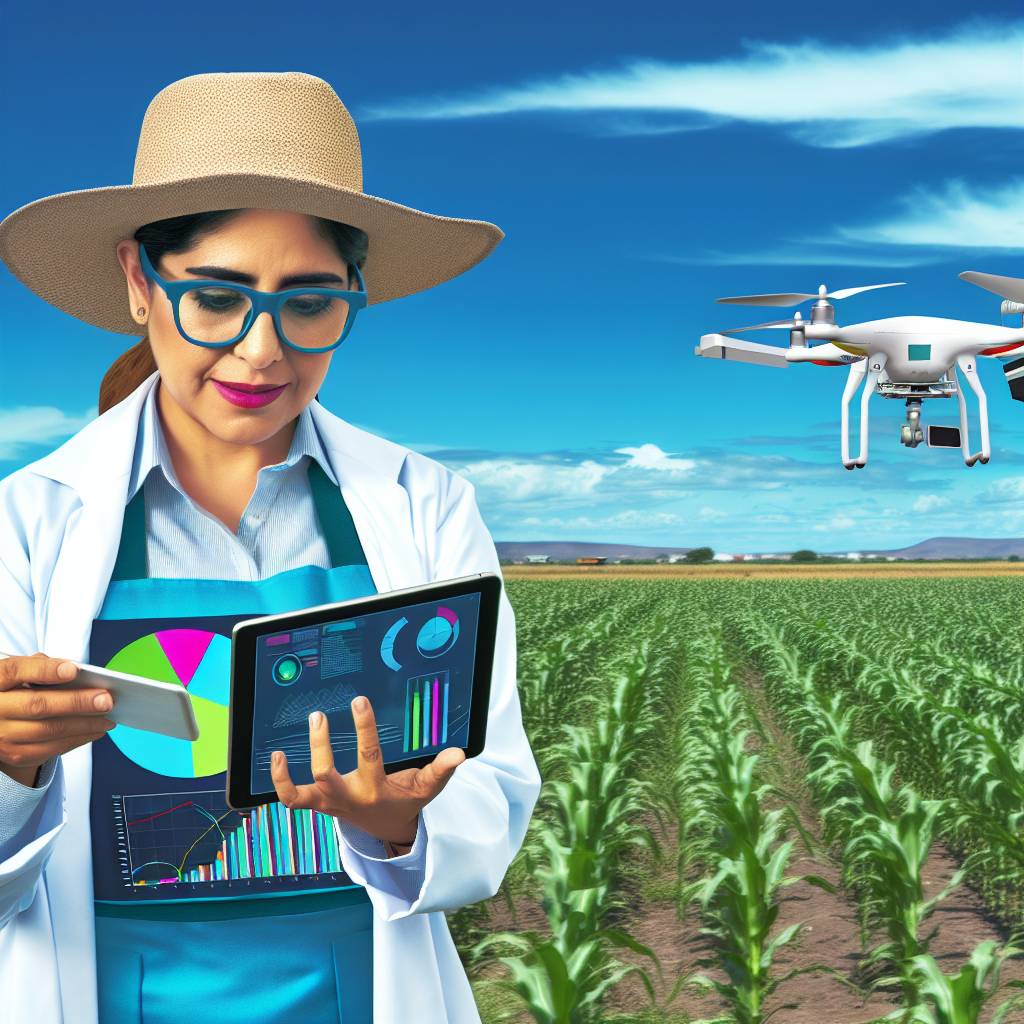
Automated Irrigation Systems and Water Management
Importance of Efficient Water Usage
Efficient water usage is crucial for successful farming.
It conserves resources and reduces operational costs.
Moreover, water efficiency supports sustainable agriculture.
Technological Innovations in Irrigation
Automated irrigation systems provide precise water application.
They monitor soil moisture levels in real-time.
This technology minimizes water wastage effectively.
For instance, systems use sensors to determine when to irrigate.
Impact on Crop Yields
Research shows that automated irrigation can boost crop yields.
These systems deliver water directly to plant roots.
Consequently, plants receive the optimal hydration they need.
Increased efficiency fosters healthier plants and higher yields.
Case Studies of Successful Implementation
Agronomist Maria Thompson implemented an automated system at her farm.
She reported a 30% reduction in water usage within the first season.
Additionally, her crop yields increased significantly during that period.
Challenges in Adoption
While promising, automated systems present various challenges.
Initial setup costs can be high for many farmers.
Moreover, familiarity with technology is necessary for effective use.
Future Potential of Automated Systems
The future of automated irrigation looks promising.
Advancements in artificial intelligence could enhance these systems.
Integrating AI will lead to even better soil and crop monitoring.
Such innovations will ultimately improve global food security.
Genetic Engineering and Biotechnology in Crop Improvement
The Role of Genetic Engineering
Genetic engineering plays a crucial role in modern agriculture.
This method allows scientists to modify plants at the genetic level.
As a result, crops can resist pests and diseases more effectively.
Moreover, genetic modifications can enhance nutritional content.
This technology also helps in developing drought-resistant crops.
Farmers benefit from increased yields and reduced losses.
Biotechnology Applications
Biotechnology enhances traditional breeding methods.
With biotechnology, researchers can introduce specific traits into crops.
For instance, biopesticides reduce the need for chemical pesticides.
This approach is safer for the environment and human health.
Showcase Your Farming Business
Publish your professional farming services profile on our blog for a one-time fee of $200 and reach a dedicated audience of farmers and agribusiness owners.
Publish Your ProfileAdditionally, biotechnology can increase the efficiency of fertilizer use.
By enhancing nutrient uptake, crops deliver better harvests.
Case Studies and Success Stories
Successful examples of genetic engineering exist across the globe.
One notable example is the Bt cotton variety in India.
This strain significantly reduced pesticide use among farmers.
Consequently, yields increased, benefiting local economies.
Another case involves Golden Rice, enriched with Vitamin A.
This innovation aims to combat malnutrition in developing countries.
Ethical Considerations and Public Perception
While genetic engineering offers many benefits, it also raises ethical concerns.
Public perception can affect the adoption of biotechnology.
Some consumers worry about potential health risks.
Transparency in labeling can help mitigate these concerns.
Education about the safety and benefits of these technologies is crucial.
Open dialogues can lead to better understanding and acceptance.
Case Studies of Farms Successfully Adopting Technology
Smart Irrigation at Willow Creek Farms
Willow Creek Farms transformed its irrigation system last year.
They installed smart irrigation technology to optimize water usage.
This system uses weather forecasts to adjust watering schedules.
As a result, the farm reduced water consumption by 30%.
Moreover, crop yields increased by 20% due to better hydration.
Precision Farming at Green Valley Estates
Green Valley Estates embraced precision farming techniques recently.
The farm adopted GPS technology for field mapping and analysis.
This technology helps in identifying areas needing fertilizers.
Consequently, they improved soil health and reduced input costs.
Moreover, they experienced a 15% increase in crop productivity.
Drones for Crop Monitoring at Sunset Ridge Farm
Sunset Ridge Farm began using drones for crop monitoring.
Drones capture aerial images to assess plant health quickly.
Farm managers can pinpoint areas requiring immediate attention.
As a result, they improved pest control and reduced chemical usage.
This led to healthier crops and minimized environmental impact.
Automated Harvesting at Riverbend Orchards
Riverbend Orchards invested in automated harvesting technology.
Robots now assist workers in picking fruits efficiently.
This innovation increased the harvest speed significantly.
Consequently, they achieved better fruit quality and reduced labor costs.
Overall, this investment paid off with higher profit margins.
Data-Driven Decisions at Maple Leaf Grain Systems
Maple Leaf Grain Systems implemented data analytics in farming.
They collect data on crop growth and environmental conditions.
This information enables farmers to make informed decisions.
Consequently, they optimized planting schedules based on predictions.
As a result, their yields improved by 25% this season.
Future Trends in Agricultural Technology and Their Potential Impact
Precision Agriculture
Precision agriculture utilizes advanced technologies to enhance crop management.
Showcase Your Farming Business
Publish your professional farming services profile on our blog for a one-time fee of $200 and reach a dedicated audience of farmers and agribusiness owners.
Publish Your ProfileThis method ensures optimal use of resources such as water and fertilizers.
Farmers benefit from data analytics to make informed decisions.
For instance, GPS technology helps in creating efficient planting patterns.
As a result, crop yields can increase significantly.
Moreover, drones monitor crop health from the sky.
This technology allows for early detection of pests and diseases.
Ultimately, precision agriculture leads to more sustainable farming practices.
Biotechnology Innovations
Biotechnology is revolutionizing how agriculture approaches crop yields.
Gene editing and crop modification enhance resistance to pests and diseases.
For example, CRISPR technology allows precise genetic alterations.
This can improve crop resilience under changing climate conditions.
As such, farmers can expect higher productivity with fewer inputs.
Furthermore, biotechnology can lead to enhanced nutritional profiles.
This innovation addresses global food security challenges effectively.
Artificial Intelligence and Machine Learning
Artificial Intelligence (AI) and machine learning are transforming agricultural practices.
These technologies analyze vast amounts of data for better decision-making.
Farmers utilize AI for predictive analytics to forecast yields.
Thus, they can plan resources more efficiently throughout the season.
Additionally, AI-driven robots assist in tasks such as planting and harvesting.
This reduces labor costs and increases operational efficiency.
Consequently, these advancements promote higher productivity without sacrificing quality.
Vertical Farming
Vertical farming presents a new frontier for food production.
This innovative technique maximizes land use in urban environments.
Utilizing hydroponics and aeroponics, crops grow in stacked layers.
This system significantly reduces the need for pesticides and fertilizers.
With controlled environments, farmers can optimize growth conditions year-round.
Furthermore, vertical farming minimizes transportation costs and food waste.
This method offers fresh produce to urban populations efficiently.
Blockchain in Agriculture
Blockchain technology enhances transparency and traceability in agriculture.
This system allows stakeholders to track products from farm to table.
Farmers gain insights into supply chain processes and consumer preferences.
Moreover, blockchain reduces the risk of fraud and ensures food safety.
This builds consumer trust and strengthens market access for farmers.
Ultimately, improving transparency boosts the overall quality of agricultural products.
Additional Resources
ARPA-E announces $38 Million to develop new technologies to …
The Environmental Benefits of Precision Agriculture Quantified …

